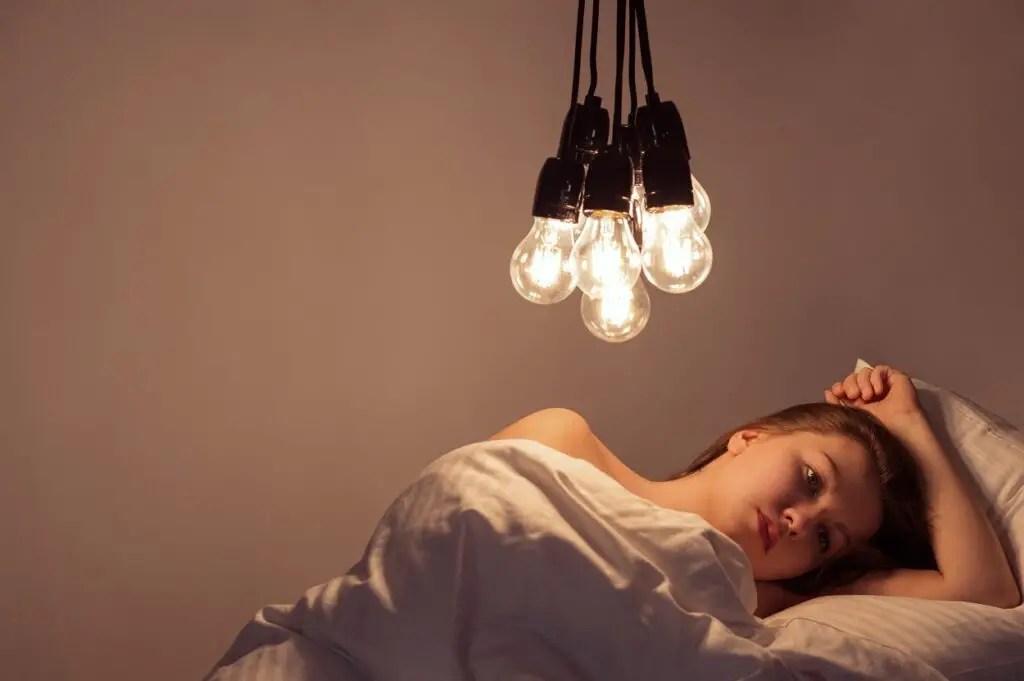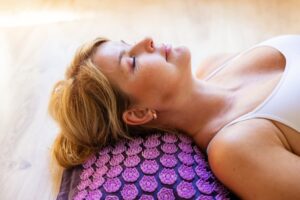Turning on a night light when you go to bed may make you feel safe and make it easier for you to move about during the night if you need to get out of bed. Have you considered whether it might be hurting your health? Is it bad to sleep with the lights on?
So many children use nightlights that you may think it’s absurd to even consider that those lights could be harming them. On top of that, plenty of people don’t even bother to turn off the light in their bedroom when they go to sleep.
That makes it easier for them to see things at night, if they hear a sound. It also makes it easy for them to get up in the morning and not stumble, if they don’t have windows or they use dark curtains.
Is it possible that sleeping with a light on is harmful to your health? If it is, I’m sure you’d want to know. Read on to find out about the potential for harm from sleeping with the light on and what health experts have to say about it.
What is Circadian Rhythm
Your body has a sleep rhythm that’s known as a circadian rhythm. This is a biological rhythm that encapsulates your entire day, including when you sleep and when you wake up.
Your body gets into a rhythm when you have a specific sleep schedule, meaning that you have a set time when you go to bed and when you wake up. If that’s fairly regular, then your circadian rhythm should be fairly normal when it comes to sleeping.
However, light can throw off your rhythm. It can throw your body out of balance by waking you up during the night or making it very difficult to get into a deep sleep. Even low-level lights can keep you from getting a restful sleep.
What this does is throw off your rhythm for the entire 24-hour period. That makes it extremely difficult for you to behave in a normal way. There are all sorts of harmful side effects that can happen because your rhythm is thrown off.
I will talk about some of those a little later on, but it’s important to know that sleeping with the light on is not healthy for you.
How Much Light Is Harmful when Sleeping
You may be wondering if a night light is okay and if that makes for a healthy substitute to simply leaving your entire bedroom Illuminated. is there danger in having a low level night light on?
Sleep research has shown that even the tiniest amount of light in the room can make it difficult for some people to sleep. Now, not everyone is a light sleeper and will be woken up throughout the night by the low level light a night light gives off.
On the other hand, some people will have disturbed, ineffective sleep because of a tiny blinking light on a modem, phone, or laptop. Think how difficult it would be for them to sleep with a glowing night light radiating throughout the room.
However, it may be very difficult for some people to sleep properly with the night light on. They may not remember waking up during the night, but many people will have difficulty achieving proper REM sleep or deep sleep with the night light on. That means they are less likely to dream and less likely to get restful sleep.
If you position the night light in such a way that it can’t be seen while you’re lying in bed, that may work for you. Some people may put the night light on the opposite side of the bed so they can’t see it very well or put it at a low position close to the floor. This makes it difficult to see the light while lying on the bed.
You can put the light in an out-of-the-way place to where you’ll still be able to see it if you get up and move about but where it won’t disturb you while you’re trying to sleep. It is important to note that even a low-level light like a night light can disturb your sleep and can keep you from getting deep, restful sleep.
What’s the Harm in Light when Sleeping
Let’s talk about some of the side effects of sleeping with the light on. I’ve briefly touched on some of these already, but let’s get in depth about how harmful sleeping with the light on can be.
Sleeping with the light on disturbs your circadian rhythm, which can affect your entire day. This 24-hour rhythm affects your behavior, mood, energy levels, and more. Disturbing your circadian rhythm can also have long-term effects.
Here are a few of the medical problems that may arise from long term use of a light when you sleep:
- Obesity
- Depression
- Nervousness
- Heart disease
- Type 2 diabetes
- Hypertension (high blood pressure)
Is it bad for you to sleep with the lights on? There are numerous short-term side effects you should know about. When you throw off your body’s rhythm and you’re not getting enough deep sleep, that’s going to affect you through the next day.
A lack of deep sleep means a lack of proper rest. That may make you feel tired throughout the day, lacking energy and lethargic. As a result, you could feel unmotivated to get things done or could even suffer from depression as a result. You may feel moody or agitated throughout the day, easily angered and feeling like your emotions are up and down.
A lack of proper sleep due to missing out on deep sleep and REM sleep means that you likely won’t dream either. Our mind uses dreams to process the events of the day, to spur creativity, and to look at our lives from a new angle. If you’re not experiencing dreams like you should, you may feel that there’s something missing in your life.
Why is it bad to sleep with the lights on? You’re basically robbing your body of the chance to heal yourself and recuperate. Deep sleep is when your body is at its most restful and when it does a lot of healing. If you’re missing out on that, you might feel achy or painful the next day, especially if you work out regularly. Your muscles won’t have time to grow and get the rejuvenation they need.
You can also look tired and haggard, and your skin may appear pale or unhealthy. Deep sleep is when our body heals itself and rejuvenates. People who sleep with the light on and don’t get enough restful sleep may constantly look ill and may have unhealthy skin. While you could cover that up with makeup, the problem is still there.
Should You Sleep with the Light on
There are some benefits to sleeping with the light on, and you’ll have to decide if they outweigh the downsides.
The most obvious one is that you’re less likely to trip and fall if you have to get up during the night or if you get up in the morning and the room would otherwise be dark without that light. Of course, an easy solution to that is to use your phone as a light when you need to get up or to keep a flashlight by your bed. That way, you have light available to you but don’t keep a light on throughout the night.
Having a light on in the bedroom at night can also help people to feel less fearful. It’s useful for children to have a night light so that they don’t feel as afraid of the dark. They get to see what is in their bedroom and may be able to sleep easier.
You’ll have to decide for yourself if the good outweighs the bad. I think it’s important that you know about the harmful effects of leaving the light on at night. While some of those side effects may not be something that you see immediately, knowing that you’re putting yourself at risk for heart disease, diabetes, and depression could make you reconsider leaving the light on at night.
My name is Ellis Francis and I have been a personal fitness trainer, sports nutritionalist and health and fitness advisor for over 25 years. I am the lead health and fitness advisor at https://awellnessbody.com.







